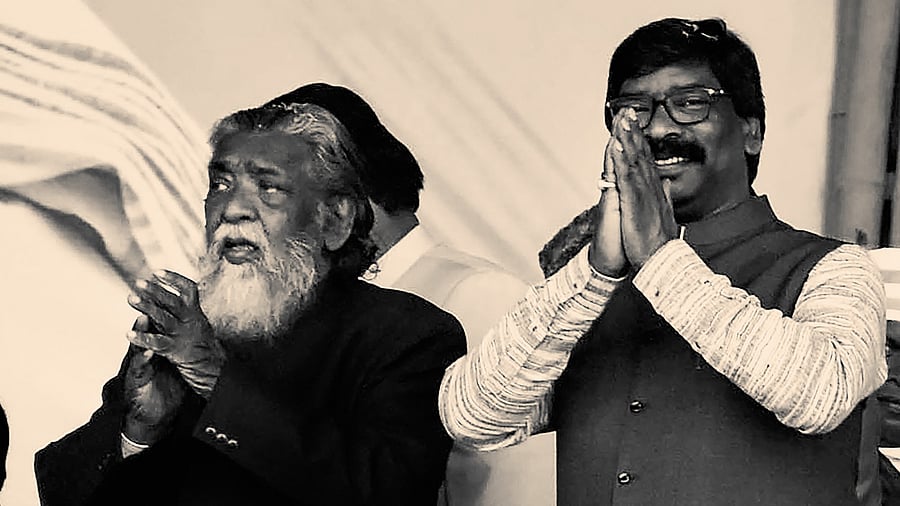
File photo of Jharkhand Chief Minister and JMM leader Hemant Soren with his father and party chief Shibu Soren.
Credit: PTI Photo
The ED crackdown on Jharkhand Mukti Morcha (JMM) and the resignation and subsequent arrest of former CM and one of India's tallest tribal leaders Hemant Soren might have come as a blow to the party, but since its formation in 1973, the path to reclaiming the Indigenous space has not been easy.
The JMM was formed in 1973 as a movement to spearhead what would become a decades-long effort to establish a separate Jharkhand state out of Bihar.
Jaipal Singh Munda of Jharkhand Party and a member of Constituent Assembly, was the first person to demand a separate state from Bihar.
Disom Guru escalates demands
In 1960s, Shibu Soren, popularly known as ‘Guruji’ or ‘Disom Guru’ (in Santhali, leader of the tribal world), emerged as the tallest leader, establishing the Pokhariya Ashram in Tundi Block of the Bokaro district. From here, he began registering complaints of exploitations faced by the adivasis at the hands of moneylenders. Initially, he led strong agitations against them, which, at times, even turned violent, bringing him under the ‘unlawful activist’ fold.
Shibu Soren took Jaipal Munda's demands to another level by lobbying politically for a separate state. He got closer to all other separate state leaders.
Soren led agitations against the exploitative class by labeling them as ‘outsiders’ and further lobbied for strengthening the Chota Nagpur Tenants Act (CNT), which restricts non-adivasis to buy/register the adivasi land in the state of Jharkhand. Soren strongly believed in reclaiming the indigenous space and voice through the framework of the Indian Constitution.
He undertook the task of uniting the adivasis against illegal mining and spearheading protests all through the 1970s amid the ongoing political turmoil across the country.
Formation of JMM
The JMM began as an alliance between a Kurmi outfit, Santhals led by Shibu Soren and a Marxist organisation. The alliance formally came into being in 1973. The Marxist Coordination Committee (MCC) headed by Communist leader A K Roy also came to support the JMM. Together, they stepped into social work in the area, gaining ground in south Bihar. The party’s primary aim was to fight moneylenders and mafia dons, especially those operating in the coal belt.
The JMM won its first Lok Sabha seat in 1980 and then in 1982, it won the assembly elections in the state. However, the government was dismissed in 1983, and the party was banned.
On June 22, 1986, the All Jharkhand Students Union (AJSU) was formed, headed by Suraj Singh Besra, who went on to become a member of the Bihar Assembly, and demanded a Jharkhand statehood Bill.
In the altered political climate of July 17, 1997, and with Lalu Prasad and his ruling RJD facing challenges, the Bihar Assembly approved a resolution for the creation of an independent Jharkhand state. Following extensive deliberations, the new state came into existence on November 15, 2000.
Politcs post statehood
The first ruling alliance of Jharkhand was formed by the BJP after the Bihar election of 2000. Babulal Marandi, who was in the BJP at that time, became the new state’s first Chief Minister and remained in power until 2003 when he resigned after facing a trust vote.
The Jharkhand Mukti Morcha (JMM), which was the face of the Jharkhand movement, was expected to perform well in the 2005 Assembly polls in the new state. However, it managed to win only 17 of the 49 Assembly seats it contested, polling 14.3 per cent of the votes. With the BJP-led National Democratic Alliance (NDA) also falling short of the halfway mark, Governor Syed Sibtey Razi invited Shibu Soren to form the government.
He went on to prove his majority and became the state’s third CM. Since then, Jharkhand has seen six CMs and three stints of President’s Rule.
In the last four polls, no party has won an outright majority in the 81-member House, leading to a series of coalition and unstable governments.
For the first time, the JMM-led alliance has 48 MLAs while the BJP-led coalition has 29 legislators. The Ajit Pawar faction of the NCP, which is in alliance with the BJP in Maharashtra, has one MLA and there are two independents.
ED raids once again injected instability into Jharkhand politics with resignation of Hemant Soren— Shibu's son and one of the loudest critics of BJP's Hindutva push in Adivasi belts. The I.N.D.I.A. bloc has termed his arrest as just another attempt to 'weaken and suppress' the Opposition while Soren himself termed it 'illegal' and a part of 'well-orchestrated conspiracy'.
Owing to comfortable majority, Shibu's close associate Champai Soren, MLA from Seraikela, has now been inducted to the top post.